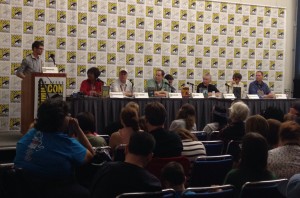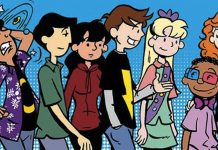By Matthew Jent
This Sunday morning panel was moderated by David Mariotte of San Diego’s own Mysterious Galaxy, a bookstore that specializes in “Martians, Murder, Magic & Mayhem.”
“Middle Grade Extravaganza” focused on the books and series for a pre-Young Adult audience, and the panelists were a mix of prose authors and graphic novelists, including Rachel Renee Russell, New York Times-bestselling author of the Dork Diaries series; EJ Altbacker, author of the Shark Wars series; “that scoundrel” Brandon Mull, author of the Fablehaven series (whose greatest regret is that he has “but one life to give for Gondor”); Paul Pope, author/illustrator of the Eisner award-winning Battling Boy; P. Craig Russell, illustrator of the graphic novel adaptation of Neil Gaiman’s Graveyard Book, as well as a number of comics adaptations of timeless operas; the “ever mysterious” and sunglasses-clad Pseudonymous Bosch, author of the Secret Series and the upcoming Bad Magic; and Mr. 50-million-copies-and-counting Dav Pilkey, creator of Captain Underpants and Ricky Ricotta’s Mighty Robot.

While it wasn’t a packed room, it was impossible to squeeze into the front rows — the fans here for this panel wanted to make sure they had a seat close to the authors.
David led off the panel by asking, “What is it about series that works so well with middle-grade readers?”
Paul Pope responded by paraphrasing Scott McCloud’s Understanding Comics assertion that the space between panels allows readers’ imaginations to fill in the gaps, allowing for a richer experience. “Episodic fiction does something similar,” he said. “You get to fill in the gaps yourself. And it’s a tradition — even the Iliad was told in episodes. ‘Come back tomorrow night, at the campire.’”
Many of the panelists said it went back to their own experiences as middle grade-age readers and wanting to spend more time with favorite characters. “I wanted to read more about Harriet the Spy,” said Rachel Renee Russell. “You want to stay with those characters.”
Asked how they keep their stories accessible for tween-age readers, Brandon Mull said it comes down to writing good scenes. “I create a chain of good scenes,” he said, with “a main characters you can relate to. But a good story is a good story.”
During the audience Q&A, a young fan asked Paul Pope how he came up with the idea for Battling Boy. Pope said he wanted to make comics for an underserved audience. “I have nephews who were your age,” he said, “and they thought it was cool I was making comics, but they can’t see most of it. It’s geared toward adults. And I’ve done work for Adventure Time or Disney, but — when I was young, I read old Fantastic Fours or X-Men, but there just aren’t that many comic books now written for people of your age group. I wanted to write the best superhero for people your age, so they don’t have to keep going back to Batman, who is 75 years old, and Spider-Man, who is middle-aged.”
Another young fan asked Dav Pilkey if he’d had a mean principal himself when he was young, and if that helped inspire his book.
“My teachers and principals were very abusive, sometimes physically,” Pilkey said. “It did not help me. I remember telling me mother — not about the physical abuse, but the emotional, psychological abuse — and my mother told me, everything happens for a reason. Maybe something good will come out of this. I don’t think she had this in mind.”
Pope added that “One of the joys have writing to a young audience is, you retain your innocence. I’m writing to myself as a younger person in a lot of way.”
Pseudonymous Bosch, who wore sunglasses throughout the panel, added that, “It helps if your own maturity level stays where it was when you were 12.” He then took an “unselfie” of the audience, asking them all to cover their faces as he took their picture.
Rachel said that her Dork Diaries were inspired by her own children, who had struggled socially as kids, but who had grown into successful artists in their own right. She introduced her daughter Nicky in the audience, and who had taken over the illustrations for the Dork Diaries with the second book.
The Q&A unfortunately ended while there was still a line of young fans waiting to talk to the authors, but the panel headed off for a group signing that would hopefully allow for some one-on-one interaction. There’s often talk around the comics industry about whether comics have left younger fans behind, but at this panel it was clear that kids were still excited about comics and illustrated prose.
The key is — as it has always been — respecting the intelligence and imaginations of your audience, regardless of their age, and creating art that raises interesting questions.
“A hundred years ago, a good sci-fi writer might image we’ll have cars,” Brandon said. “But a great sci-fi writer will imagine we’ll have traffic jams.”








Comments are closed.